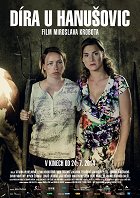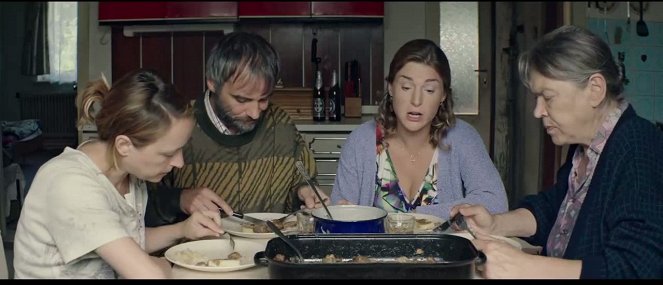Regie:
Miroslav KrobotKamera:
Jan Baset StřítežskýBesetzung:
Tatiana Dyková, Lenka Krobotová, Johanna Tesařová, Ivan Trojan, Jaroslav Plesl, Simona Babčáková, David Novotný, Hynek Čermák, Lukáš Latinák, Ján Kožuch (mehr)Inhalte(1)
In a small village in the mountains of Moravia lives Maruna (35), who works at the local pub, takes care of her dictatorial mother, and has several affairs among the local men without, however, finding love. Maruna's sister is more ambitious, and when she has a chance to leave the village she takes it. For Maruna, the village is her destiny – one that she can never be separated from. Also living in this sleepy hollow are two forest workers who share the same woman, with whom they live together in an old cottage. The whole village knows their arrangement, and in a way tolerates it. But one day, the woman disappears and is later found murdered. For just a moment, the village's usual calm atmosphere is disturbed, but otherwise everything remains in its routine. When Maruna gets pregnant, she suddenly realizes that her life is too much like her mother's. The circle is closed. (Verleiher-Text)
(mehr)Kritiken (8)
Ein konzentriert aufgenommenes Nichts. Je mehr von solchen Filmen entstehen wird, desto bedeutender wird in der tschechischen Kinematografie die Komödie von Chytilová Das Erbe oder: Fuckoffjungsgutntag. Nowhere in Moravia hat keine so treffende und witzige Szene wie der Film Das Erbe oder: Fuckoffjungsgutntag, welcher damit vollgestopft ist.
()
(49th KVIFF) The relatively bizarre portray of Czech rednecks, with almost Twin Peaks dimensions even, and a funny joke here and there are a plus. However, like many other Czech films, Nowhere in Moravia is missing a clear theme or plot, something that is manifest, for instance, by the fact that almost any of the scenes of the last twenty minutes could have easily been the last, and nothing would be left unsaid (because, they actually never had anything to say). Most of the humour, as it’s the unpleasant habit in Czech movies, follows the template of famous actor speaking foully or behaving like an idiot = funny. Though, to be fair, the template here is enriched with the Moravian dialect. What an innovation.
()
An admirable performance in the discipline of "depicting a village stereotype," which simply cannot be titled anything other than another stereotype: "It’s good for Prague people," which is all the more disappointing because Krobot is a native of the region and in fact denies in such a fundamental way what he should understand best. The Prague actors spout dialect and vulgarisms through their teeth in a dysfunctional way and function only as wearers of great costumes. Yet it's an indescribably sad story, where the writer and producers seem to have realized at the last minute that the film would sell better as a redneck comedy. Fail.
()
Ein paar auf interessante Art und weise aufgeschlüsselte Szenen sowie der Zwang, sich der Deadpan-Poetik zu widmen, reichen nicht aus, wenn der Film auf den klassischen Pfeilern einer tschechischen Komödie ruht: Hillbillies, Kümmerlinge, verschwitzter Geschlechtsverkehr, in "Comic-Verkleidungen" übertrieben spielende Stars. Hinzu kommen da noch die dummen Stereotypen mitsamt der Erfindung einer neuen Dialektform, welche das einzige ist, wodurch sich der bekannte tschechische Schauspieler Krobot tatsächlich auszeichnet. Das Nowhere in Moravia kommt mit dem Elend der heimischen Filmemacherei daher - und zwar in vollem Umfang, allerdings in einer bekömmlicheren Verpackung.
()
Czech intellectuals who concentrate in cities usually go through two phases in relation to the countryside. The first represents idealization. They associate the intimately familiar urban environment with all imaginable flaws of modern civilization - consumerism, egoism, self-centeredness, promiscuity, and overall moral degradation. The countryside is supposed to be a place where the communal way of existence still functions, where people live modestly and in a harmonious relationship with nature, engage in publicly beneficial work, and preserve valuable cultural traditions of past generations. This idealization is even stronger when it can be supported by filtered childhood memories when they experienced wonderful adventures with relatives. Let's clarify what the countryside is not: satellite towns in the area around big cities with good transportation services, where those who cannot afford expensive urban housing move to. When intellectuals become acquainted with the reality of the countryside, the second phase sets in: profound disappointment. The intellectual is taken aback by the poverty of spirit (those who want something from life head elsewhere for education), the absence of the younger generation, the harshly pragmatic and even cynical relationship with nature, encountering envy and the desire for inaccessible consumption, which often takes on a sadly grotesque form. Cultural stimuli are missing, and instead of warm camaraderie, there prevails isolation and mistrust. Miroslav Krobot clearly went through the second phase during the filming, and the result reflects that. As a comedy, the film works if you are willing to reduce the comedic aspect to caricatures of rural boors. However, it does not work in terms of its dramaturgy, and Krobot did not showcase himself as a director with this film. The only strong aspect is the cast, which utilizes the strong lineup of the Dejvice Theater. I don't really understand the awards it received because it is a film that should not be included in the nomination at all, let alone reap its rewards. As a portrayal of life in a village, it is forced and exaggerated, and one is rather inclined to contemplate how the local economy and society function. Does a pub survive in a settlement with only a few dozen inhabitants? Overall impression: 40%.
()
A lot of people probably overlooked that the film is not called Vikantice u Hanušovic and that it is not a documentary about a village, but a film about people, or rather about human nature, about the faltering human destiny, about the effort to get from somewhere to somewhere, or from nowhere to nowhere. I believe this is one of the best Czech films in recent years. I can feel something of the Czechoslovak New Wave of the 1960s in it, it also takes place in a kind of non-specific timelessness, and it's a bit theatrical. It's more of an absurd metaphor than a normal story, which makes it more impressive. I thoroughly enjoyed not only the weird mood, but especially the top-notch performances by everyone, and I do mean everyone. I didn't expect the ratings to be so low and me to go so much against the tide.
()
Das Fehlen einer umfassenden Handlung, das langsame Tempo und hauptsächlich die vollständig statische Kamera unterstreichen den Minimalismus und die Banalität des mährischen Dorfes und spiegeln die Ruhe und den zögerlichen Lebensstil seiner Bewohner wider. Miroslav Krobot ist es gelungen, seine klare Vision vollständig umzusetzen, was seine kreativen und Regiefähigkeiten belegt. Es handelt sich jedoch nicht gerade um eine besonders unterhaltsame Vision, da das erfolgreiche Einfangen der Atmosphäre der abgelegenen Ecken des Jeseník-Gebiets durch mehrere Fragmente aus dem Schicksal eigenwilliger Dorfbewohner nicht für einen abendfüllenden Film ausreicht. Erwarten Sie auch keine komödiantische Lachparade. Es handelt sich um einen realistischen Blick in die Mikrowelt eines Dorfes und gleichzeitig um eine persönliche Aussage von Miroslav Krobot, der mit seinem ersten eigenen Film definitiv keinen Fehltritt gemacht hat. Dennoch lässt sich eine gewisse Enttäuschung nicht überdecken.
()
Fans des Theaters Dejvice kann dieses Ensemble um Miroslav Krobot einfach nicht enttäuschen. Ich begann zwar nach den ersten fünfzehn Minuten zu zweifeln, dann aber zerstreuten sich meine Zweifel vollständig, und ich habe mich wunderbar amüsiert. Der Humor fußt stark auf Vulgarismen, doch darin ist das Tschechische eben gerade schön, wenn man es in geeigneter Form einsetzt, dann haben diese eine gleichwertige Stellung wie schriftsprachliche Formen. Schauspielerisch passte es meines Erachtens am besten auf Simona Babčáková und Jaroslav Plesl. Der Einzige, der gefehlt hat, war wohl eigentlich Neužil.
()

